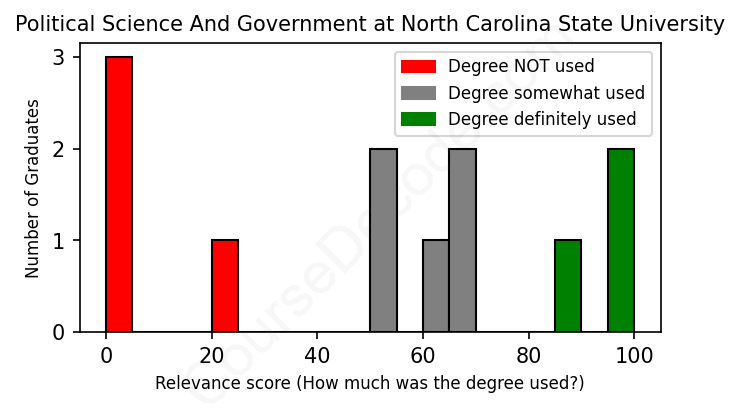
First, some facts. Of the Political Science And Government graduates from North Carolina State University we've analyzed , here's how many have used (or NOT used) their degree in their career:

These are estimates based on AI analysis of 12 LinkedIn profiles (see below).
The verdict? Significantly below average. Overall, with an average relevance score of 51%, Political Science And Government graduates from North Carolina State University have a much lower likelihood (-16%) of finding work in this field compared to the average graduate across all fields:
And for comparison, here's the chart for all profiles we've looked at across all degrees.
Also, after graduating, 58% of these graduates have pursued further education other than another Bachelor's degree (such as a Masters degree or other), compared to the average across all profiles of 35%. This suggests you may need more than just a Bachelors degree to be competitive as a Political Science And Government graduate.
See the details:
|
Relevance score: 0% We think this person has NOT gone into a career related to their degree. We think this person has NOT gone into a career related to their degree.
DEGREE INFOGraduated in 2020 from North Carolina State University with a Bachelor of Science - BS in Political Science And Government. No other secondary education since. JOB HISTORY SINCE GRADUATIONAccounts Receivable Clerk Piedmont Service Group Jan 2022 - Sep 2022 Office Assistant  Piedmont Service Group Aug 2020 - Present Accounts Payable Clerk  Gentry Service Group Jan 2023 - Present ABOUTExperienced Office Assistant with a demonstrated history of working in the facilities services industry. Skilled in Customer Service, Microsoft Word, Public Speaking, Microsoft Office, and Microsoft PowerPoint. Strong administrative professional with a Bachelor of Science - Political Science from North Carolina State University. |
The top 10 most common jobs done by the graduates we've analyzed (ranked most common to least) are:
When looking at the career paths of individuals who studied Political Science and Government at North Carolina State University, there’s a noticeable trend toward legal and government-related careers. Many graduates have found their way into roles like law clerks, attorneys, and various positions within government agencies. For instance, several have worked as law clerks or staff attorneys, which directly apply concepts from their studies in legal principles and government policies. Additionally, internships at government offices, like those at the North Carolina Treasurer or the U.S. House of Representatives, help to kickstart a career rooted in political understanding, showing that many graduates are leveraging their education in positions that are closely aligned with the field.
However, it’s also clear that not every job these individuals have taken is directly connected to their degree. Some graduates ended up in roles like oil and gas specialists or positions in retail, where the skills learned in political science aren’t directly applicable. While these roles may incorporate some organizational skills or an understanding of regulations, they don’t engage deeply with the core knowledge of governance and political processes. Overall, it's a mixed bag. Many grads are effectively utilizing their Political Science and Government degrees in relevant and impactful ways, but there are also quite a few who have veered off into unrelated fields, which can make it challenging for future students to gauge what career paths they might take after graduation. It's definitely a field that offers diverse opportunities, but students should be aware that the connection to political science isn’t always guaranteed in every job they might consider.
Here is a visual representation of the most common words in job titles for Political Science And Government graduates (this is across all Political Science And Government graduates we've analyzed, not just those who went to North Carolina State University):

Overall, graduates from North Carolina State University who have a degree in Political Science and Government have demonstrated a variety of career paths, with many making significant strides in relevant fields post-graduation. Right after getting their degrees, it seems common for them to start off in internships or positions that offer valuable experience in law, government, or public service. For instance, many began as legislative interns or clerks in law firms shortly after graduation. These roles appear to set a solid foundation for more advanced positions in both the legal sector and government, reflecting the skill set these graduates have developed during their studies.
Five to ten years down the line, you can see a split in their trajectories. Some have smoothly transitioned into more specialized roles like attorneys, budget analysts, or state planners, showing that they’re effectively utilizing their political science backgrounds. Others have veered off into different areas, such as sales in the tech industry or teaching, which may not directly correlate to their degrees. Still, many of the graduates find their way back to relevant careers in law, government, or policy, indicating a strong connection to their majors. Ultimately, while some graduates may face challenges in aligning their careers strictly with political science, a notable portion manages to succeed in law, government relations, and policy roles, allowing them to leverage their education effectively over the long term.
Honestly, a Bachelor’s degree in Political Science and Government at North Carolina State University is about what you'd expect for a college degree: it can be challenging but also really rewarding. You'll face a mix of theory, practical applications, and maybe a bit of writing-heavy coursework. It's not the easiest path—there's a decent amount of reading and analysis involved—but it's also not the hardest; many students find that they enjoy the topics and can relate them to current events, which can make studying a lot more engaging. If you've got a passion for politics and a willingness to put in the effort, you’ll probably find it manageable and definitely interesting!
Most commonly, in the LinkedIn profiles we've looked at, it takes people 4 years to finish a Bachelor degree in Political Science And Government.
So, looking at these North Carolina State University grads, it seems like a mixed bag when it comes to making decent money. Some, especially those who went into law and government roles, have likely found themselves in more stable and potentially lucrative positions over time, like the Staff Attorney or various roles at NCDOT, which often pay well. On the flip side, you've got folks in the oil and gas sector and those starting out in teaching and public service who might have a tougher time financially, especially at the beginning. The recent grads, like the one serving as a server, might be starting to find their footing, but they're definitely not raking it in just yet. Overall, it seems like some are on promising paths, but others might struggle a bit before hitting their stride financially.
Here is a visual representation of the most common words seen in the "about" section of LinkedIn profiles who have a Bachelor degree in Political Science And Government (this is across all Political Science And Government graduates we've analyzed, not just those who went to North Carolina State University). This may or may not be useful:

Here are all colleges offering a Bachelor degree in Political Science And Government (ordered by the average relevance score of their Political Science And Government graduates, best to worst) where we have analyzed at least 10 of their graduates: